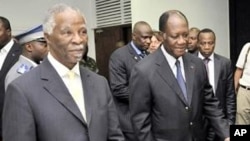Ivory Coast is in political crisis with both of its presidential candidates taking rival oaths of office based on competing election results. Former South African leader Thabo Mbeki met on Sunday with both would-be presidents in hopes of resolving the stand-off.
The African Union says Mr. Mbeki's emergency mission is meant to find a legitimate and peaceful solution to the crisis.
The former South African president says he is here to better understand what is going on in a country that now has two men who say they are president. "What we are doing now is to talk to everybody to try and get a direct understanding of the situation in Cote d'Ivoire," he said.
Laurent Gbagbo took an oath of office on Saturday on the basis of the constitutional council awarding him 51 percent of the vote after disqualifying as fraudulent nearly 10 percent of all of the ballots cast.
Alassane Ouattara also took an oath of office Saturday, but based of the electoral commission awarding him 54 percent of the vote. Those results were certified by the United Nations in keeping with a 2007 peace deal.
Senior military officers who control southern regions support Mr. Gbagbo. Former rebels who still control most northern regions back Mr. Ouattara.
Mr. Ouattara says he met with Mr. Mbeki on Sunday as the rightful president of Ivory Coast. Mr. Ouattara says he asked the former South African leader to ask Mr. Gbagbo to give up power because he lost the election.
Mr. Ouattara's claim to the presidency is backed by Burkina Faso, Nigeria, the United States, France, the United Kingdom, Canada, and the European Union.
Mr. Gbagbo called foreign support for Mr. Ouattara interference that threatens Ivory Coast's sovereignty.
Mr. Gbagbo's resistance to international opinion might complicate Mr. Mbeki's mission because the African Union also has recognized electoral commission results that say Mr. Gbabgo lost. In a written statement, the African Union warned against undermining the electoral process and the will of the people, saying that could lead to a "crisis of incalculable consequences."
Mr. Ouattara's would-be government has named 13 new ministers, including the former rebel leader and interim Prime Minister Guillaume Soro as the new prime minister and defense minister.
Soldiers are manning roadblocks across Abidjan. The country is under an overnight curfew. Foreign news broadcasts are suspended indefinitely.
U.N. agencies met Sunday to discuss the evacuation of all staff because of the deteriorating security situation. They are expected to make a decision on evacuation on Monday.
African Union Sends Mbeki to Mediate Ivory Coast Presidential Crisis




